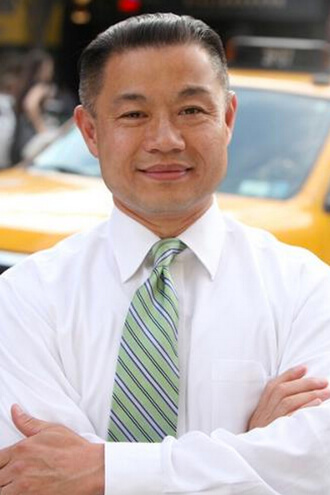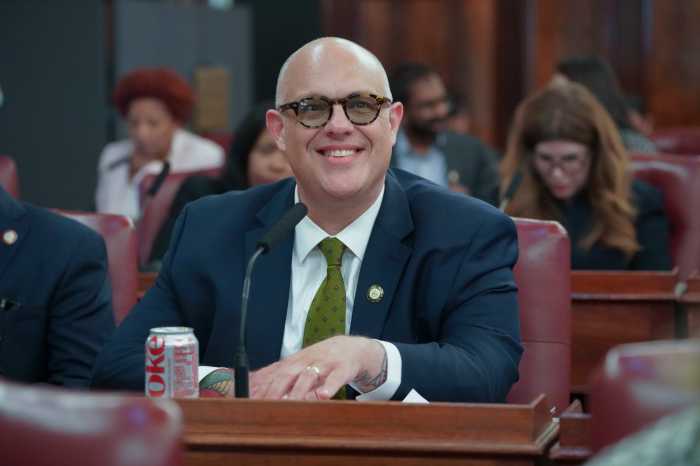ILLUSTRATION BY MICHAEL SHIREY
BY PAUL SCHINDLER | Incumbency means a lot in the New York State Legislature, so it’s not often that voters encounter a serious primary election challenge to a sitting member of the Senate or the Assembly. There are exceptions, though — two years ago, three of the four Republican senators who supported the 2011 marriage equality law faced Tea Party-style challenges and two of them fell.
This year is one of those exceptional times among State Senate Democrats — with a Bronx incumbent, Jeff Klein, and one in Queens, Tony Avella, facing well-known opponents in the September 9 primary.
What’s perhaps more unusual is that among the four candidates in the two contests, all have strong pro-LGBT voting records and community advocates are strikingly split in their endorsements.
More typical is the fact that these two battles are about a lot more than simply one district that snakes, gerrymander-style, through the Bronx and captures a bit of Westchester County, too, and another that hugs the northeast corner of Queens. Though this is a primary within the Democratic Party, at heart these contests are arguments about loyalty to the notion that Democrats should be in charge of the Senate. And they are also battles about priorities within the State Democratic Party and, perhaps as well, about the relationship between the Senate and New York’s Democratic governor, Andrew Cuomo.
More than any other reason, Klein and Avella face challenges because in the legislative session just ended the two did not lend their votes to giving the Democrats control of the Senate. Instead, they were part of a five-member faction of Democrats, led by Klein and known as the Independent Democratic Conference (IDC), that governed in coalition with the Republicans. With scandals and recent vacancies, the relative strength of the two major parties in the Senate has shifted around a bit during the two years since the last election, but at no time during that period did Republicans have enough votes to govern as a majority on their own.
In other words, the IDC bloc was critical in giving the lead role in the Senate to Long Island Republican Dean Skelos, though Klein served as the junior partner in the chamber’s governing coalition.
For other Democrats and many progressives among the party’s rank and file, the IDC’s desertion grated.
Bronx State Senator Jeff Klein. | JEFFKLEINNY.COM
Goals high on the progressive agenda — Cuomo’s Women’s Equality Act, a larger minimum wage increase than was enacted, and campaign finance reform — were blocked by the Senate’s Republican leadership. As were a long-stalled transgender civil rights measure — the Gender Expression Non-Discrimination Act (GENDA) — and a bill that would bar mental health professionals from providing so-called “reparative therapy” (known in the legislation as “sexual orientation change efforts,” or SOCE) on patients who are minors.
As Democratic senators struggled to get votes on these issues this past spring, they and the measures’ advocates regularly excoriated IDC members for enabling the Republican resistance to progressive change. It’s a sign of how familiar that refrain has become that Kathy Hochul — Cuomo’s pick for lieutenant governor who is scrambling to quiet criticism among progressives about her brief time in Congress — has now taken aim at the IDC for blocking the Women’s Equality Act.
In the Bronx, Klein is facing off against Oliver Koppell, a former member of the City Council and the State Assembly who served for a brief time in the early 1990s as the state’s appointed attorney general. The district includes Riverdale in the northwest Bronx, a thread of territory across the borough, and then communities bordering the Long Island Sound from the South Bronx up into Westchester.
For months Koppell, who is 73, has talked about Klein’s role in leading the IDC as “an outrageous betrayal,” and in comments to Gay City News this week broadened his attack on the incumbent, characterizing him as “the king of pay-to-play politics” for his ties to special interests, especially in the real estate world. Significantly, in a race where Klein has most of the major endorsements, Koppell enjoys the backing of Michael McKee, a leader in the city’s tenants’ rights movement.
Klein's primary opponent, former City Councilman Oliver Koppell. | KOPPELL4NY.COM
Klein, who is 54, has not responded to Gay City News’ requests for comment — either during the legislative session or now as the primary campaign is winding up — but in a recent debate on NY1 defended his progressive credentials by pointing to his key role in enacting the governor’s new gun control law early last year and in funding pre-K education this year. He also noted that he’s won endorsements from Cuomo, Mayor Bill de Blasio, and Bronx Borough President Ruben Diaz, Jr.
In Queens, Avella, a 62-year-old former City Council member, is also facing a well-known challenger — former City Comptroller John Liu, who served on the Council during the same years the incumbent did. Avella first went to the Senate — representing a district including neighborhoods from Flushing, College Point, and Whitestone to Fresh Meadows and Little Neck — in 2010, when he beat longtime Republican Senator Frank Padavan, a social conservative, on a platform endorsing marriage equality, a year before that became law with just one more vote than the minimum required.
Liu, however, is also employing the term betrayal to characterize Avella’s lack of fidelity to the Democratic Party and, therefore, progressive issues such as the Women’s Equality Act, a more generous minimum wage, and permanent funding for de Blasio’s pre-K initiative in the form of higher income taxes on the wealthiest city residents. Those goals as well as GENDA and the SOCE legislation would have been law long ago had the IDC not defected, Liu, who is 47, told Gay City News.
Avella offers a different assessment of what has been possible to date in the Senate. A Democratic majority, he noted, is not the same thing as a progressive majority. Two Democrats, the Reverend Ruben Diaz, Sr., of the Bronx, and Brooklyn’s Simcha Felder (who in any event caucuses with the Republicans separate from the IDC) are hostile to LGBT rights, and the recent indictments of two former Senate Democratic leaders still in office — Malcolm Smith of Queens and John Sampson of Brooklyn — recall in Avella’s mind and others’ the dysfunction that beset the Senate when the Democrats last had control, in 2009 and 2010.
In comments to Gay City News, Avella argued that his role in the IDC was the most constructive route open to him in the Senate, allowing him to get 17 bills passed, most of which would have died but for the governing coalition he was part of. In the final days of this spring’s legislative session, he told this newspaper he hoped to see action on the SOCE legislation, which he believed had a stronger chance of passage than GENDA, but his later laying the failure of that happening at the Republicans’ feet sidesteps the central critique Liu makes of his record.
The intensity of the attack Liu is waging against Avella — and Koppell against Klein — was blunted significantly in late June, right after the Legislature adjourned, when the IDC announced it had reached agreement with the Democratic Conference to return to the fold come January. More than a few observers have asked whether the rationale for those challenges is now moot.
Queens State Senator Tony Avella. | TONYAVELLAFORNY.COM
Liu pushed back hard against that assumption.
“That’s the thing about betrayal,” he told Gay City News. “It’s hard to take back. Especially since there’s a clear alternative.”
Koppell, meanwhile, took credit for the IDC announcement.
“I achieved a considerable amount,” he said. There would be no talk of Klein leaving Skelos’ side, he argued, “if I hadn’t been in the race.”
Still, he is mistrustful of the IDC’s ultimate intentions, noting that its members have no plans to abandon their separate conference and that Klein aims to share power with the Democratic leader, Westchester’s Andrea Stewart-Cousins, in the same manner he currently does with Skelos.
“That is the most undemocratic way to act,” Koppell said. “He and four colleagues will have the same power as 28 Democrats?”
Despite Koppell and Liu’s arguments, however, there is clear evidence the IDC’s change of heart has shifted the dynamics in both races — though to varying degrees.
As the legislative session was winding down, Nathan Schaefer, the executive director of the Empire State Pride Agenda (ESPA), was careful not to tip his group’s hand regarding the fall elections and took pains to credit the efforts of several IDC members, Avella included, for trying to move the GENDA and SOCE legislation. Still, he was clearly frustrated at how the existing leadership configuration had stymied his group’s top goals.
“There is no reason why these two bills critically important to the lives of LGBT New Yorkers did not pass in the Senate this session,” Schaefer said after it concluded, adding, “There certainly is cause to see a need for a change in the composition of the leadership. The current leadership isn’t allowing LGBT bills to get to the floor.”
Now that the primary is at hand, ESPA is banking on Klein and Avella playing a constructive role in a prospective Democratic majority next year. Explaining the group’s endorsement of the two incumbents, Schaefer said, “With the IDC returning, we are very optimistic about the success of both the conversion bill and GENDA.”
Avella's challenger, former City Comptroller John Liu. | LIUNEWYORK.COM
Asked whether the group is confident that Klein and his fellow IDC members will remain true to their pledge, he said, “We are very hopeful that they are going to keep their commitment,” while explaining that ESPA’s candidate criteria is based on public “commitment to our issues.”
“We don’t get into the political allegiances,” Schaefer said, even while conceding the IDC’s “caucusing with the Republicans was not conducive to getting the bills through.”
Allen Roskoff, president of the Jim Owles Liberal Democratic Club, an LGBT group, was scornful of that analysis.
“It’s beyond me why any gay organization would support Klein when he was the key to our not getting GENDA or the conversion bill,” he said.
Jim Owles is supporting Koppell with a major mailing on the weekend leading up to the primary, and originally endorsed Liu as well. The club has since fallen out with him over what Roskoff described as the former comptroller reneging on a commitment to support a September 6 rally outside Cuomo’s Westchester County home demanding that the governor consider clemency appeals from certain state inmates.
Liu does, however, enjoy the support of both the Lesbian and Gay Democratic Club of Queens and the Stonewall Democratic Club of New York City. Stonewall, like Jim Owles a citywide club, has also endorsed Koppell.
Noting that its endorsements reflected the votes of roughly 300 members, Eunic Ortiz, Stonewall’s president, told Gay City News, said, “The LGBT community has come together and said we want to see a change, and the vote reflects the view that ‘Enough is enough.’” For some in the community, she said, marriage equality was the main goal, but many others see a big agenda ahead “to reach full equality.”
According to Gotham Gazette, Klein faced “hostile questioning” when he appeared at Stonewall the night of the group’s endorsement vote. The website reported that in a “testy” exchange, the senator told former Stonewall president Melissa Sklarz, a transgender activist who sits on the ESPA board, that Democrats had failed to line up the votes for GENDA.
This week, Sklarz disputed Klein’s vote count and reiterated that activists, including the Pride Agenda, had demanded an up or down vote in the Senate on GENDA — which has been blocked for a dozen years — regardless of the outcome. Supporters of the SOCE measure, who also pressed for a vote, voiced strong confidence they would have won on the Senate floor, with sponsor Brad Hoylman, an out gay West Side Democrat, pointing to public support for the measure from Republicans.
Other leading progressive groups were apparently more forgiving than the gay Democratic clubs. Early in the campaign year, the Working Families Party announced it would support both Koppell and Liu. After the IDC mended fences with the rest of the Senate Democrats, however, the WFP pulled those endorsements and is now neutral in both races.
The WFP’s about-face came just weeks after it had changed course in the governor’s race. Cuomo forestalled the potential embarrassment of that party endorsing his Democratic primary opponent, Zephyr Teachout, after hurried negotiations that resulted in the governor pledging to put his shoulder to the wheel in electing Senate Democrats. Klein’s subsequent announcement that the IDC would cross back over the aisle advanced that same agenda.
But Liu and Koppell retain other support beyond the LGBT Democratic clubs. In fact, Liu is the county organization’s candidate in the primary, and the former comptroller said, “I have the support not just of some of the local elected officials, not just of most of them, but of all of them.” Liu, who has roughly a four-to-one advantage in campaign funds on hand, also won the endorsement of the New York Times, though the incumbent has the support of the mayor.
Koppell, despite also having won the Times’ nod, would seem to face longer odds. His $113,000 in campaign funds on hand pales in comparison to the $1.2 million war chest held by Klein, who also enjoys strong party support locally and city- and statewide, in part by having 0disarmed the Democratic Senate Conference in agreeing to return to the fold.
Still, Koppell has the endorsement and financial support of Klein’s Manhattan colleague Liz Krueger — who is also backing Liu in Queens — as well as Bronx Senator Gustavo Rivera, a hard-charging progressive and relative newcomer who knocked off scandal-ridden incumbent Pedro Espada four years ago. For a time, the IDC had considered retaliating by supporting Rivera’s stridently anti-gay primary challenger, City Councilman Fernando Cabrera, but in the end concluded that was a bridge too far.
A week out from the primary, Koppell remains upbeat, saying he is well-received even in portions of the district that he never represented while on the Council or in the Assembly.
“I have the support of the activist Democrats,” he told Gay City News. “They are the ones who will turn out to vote in a primary.






















